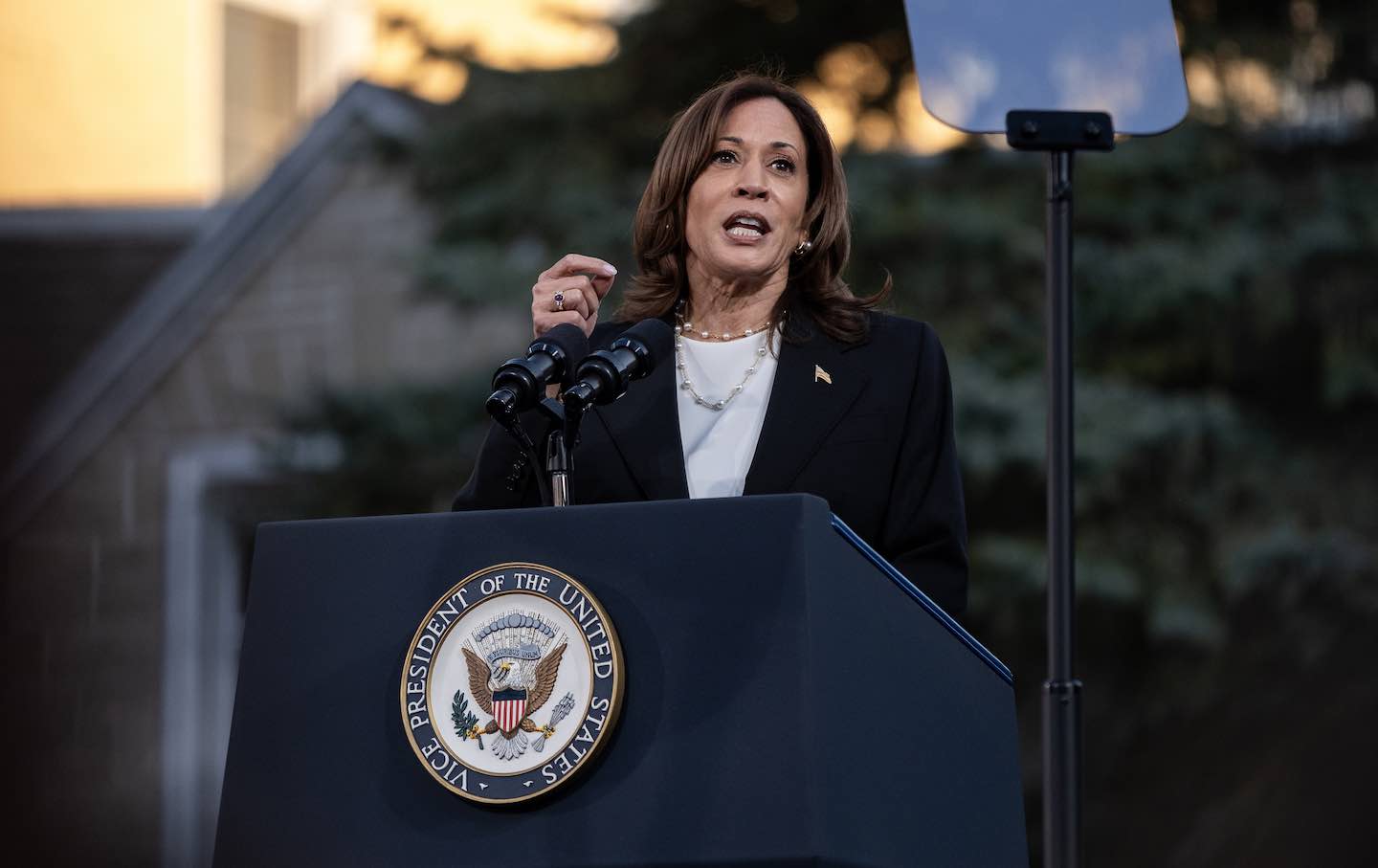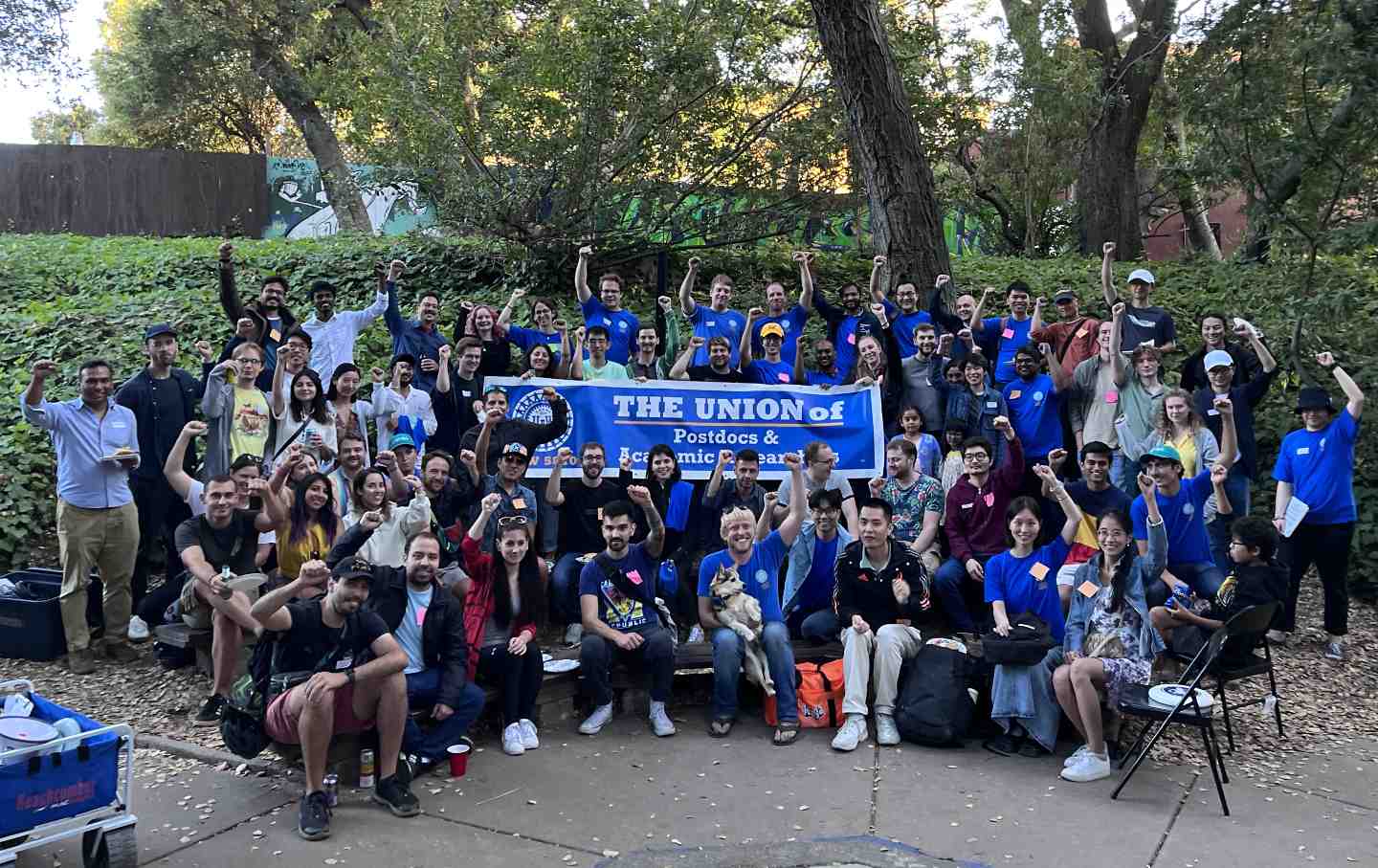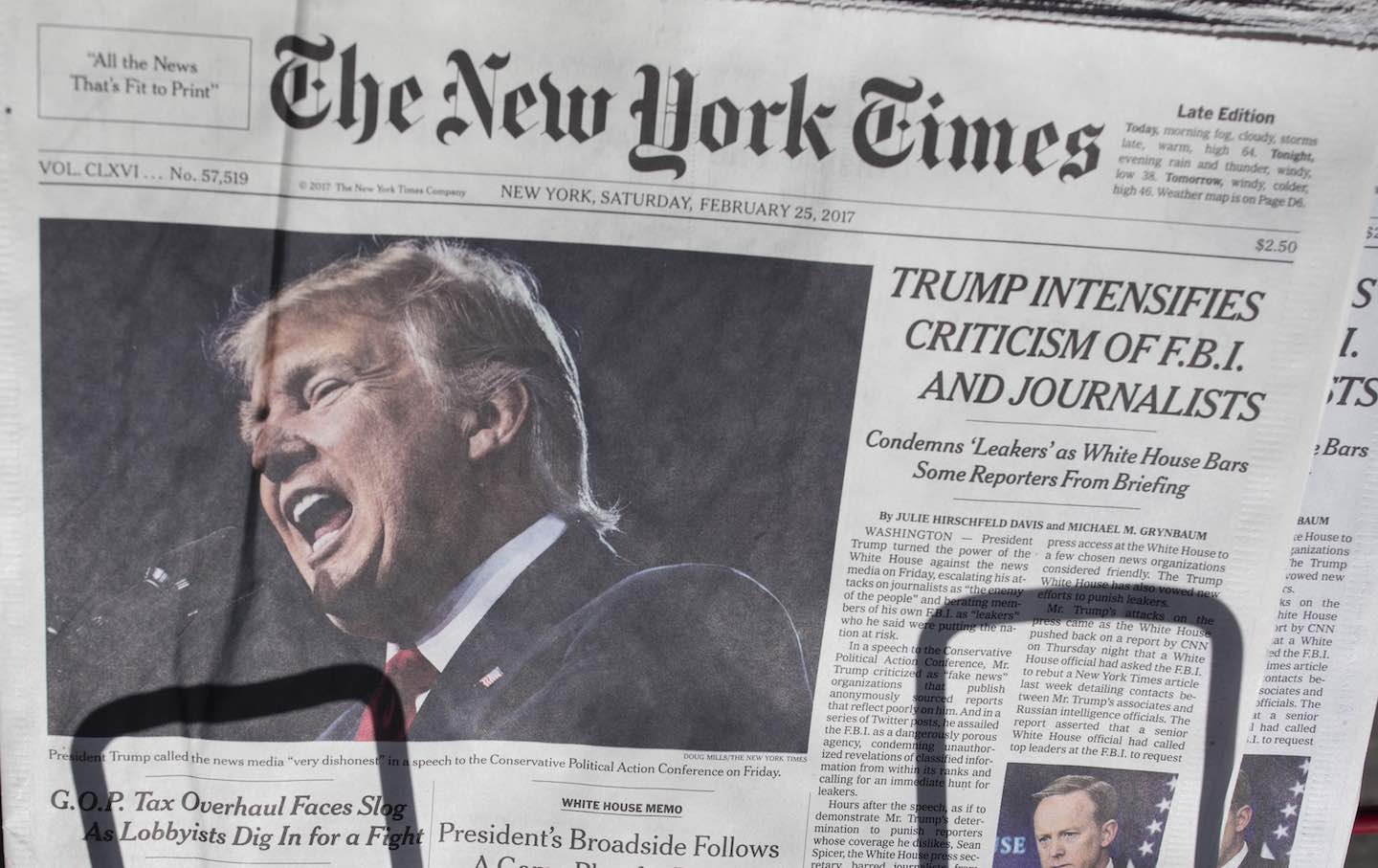[ad_1]
Policy
/
October 16, 2024
Embracing right-wing Republicans won’t excite undecided voters. Partnering with a popular Democrat who understands battleground states like Wisconsin.

Democratic presidential candidate Kamala Harris speaks at a rally at Ripon College on October 3, 2024 in Ripon, Wisconsin.
(Jim Veruluska/Getty Images)
So many strategists, pundits and honest observers of the 2024 presidential campaign are amazed that Kamala Harris hasn’t won a majority as Election Day approaches. The Democratic nominee defeated Donald Trump in their only debate and ran an energetic, often inspiring campaign against his rival’s insanity and anti-immigrant rants. Still, at best, Harris maintains only a narrow lead over the Republican, and at worst, he’s struggling to get ahead of himself in several battleground states that will decide who makes up the Electoral College.
There are many reasons for this, but one of the best explanations is this: Harris hung out with the wrong crowd.
Take Wisconsin, a swing state that Harris must win. He works hard to do this. But his last major appearance – a visit to Ripon, the birthplace of the GOP – was with Liz Cheney. The former member of the House of Representatives is a well-known far-right Republican who did a lot to establish the foundations of Trump and Trumpism. Stripped of the former president’s violently authoritarian embrace, Cheney is supporting Harris this year, as was his father, Dick. But Cheneys are still Cheneys.
Liz Cheney has been an advocate of right-wing politics for decades; a Republican zealot who in addition He is campaigning for Trump in 2016 and 2020he supported even more extreme members of the party’s caucus as he preached vile anti-immigrant, anti-labor and anti-suffrage rhetoric. As the leader of the House Republican caucus, he has made his party more brutal, extreme and threatening under Trump’s presidency. The threats were now beginning to frighten even him; but that doesn’t change the fact that he helped set the GOP on its current course.
Current number

So did Dick Cheney, who was never popular in Wisconsin. The former vice president, who lost Wisconsin on the Republican ticket in 2000 and 2004, should always be remembered.
Hoping that association with the Cheneys will move votes in Wisconsin in 2024 is foolish. Yes, there will be Republicans who cross over and vote the Democratic ticket this year, but most made that decision months ago. It’s hard to imagine anyone saying, “I was all for Trump until I heard Dick Cheney was endorsing Harris.”
If Harris wants to win Wisconsin, he should stop playing with the Cheneys and start talking about the support he has received Barack Obamawho is currently following the campaign trail as the top surrogate for the Democratic presidential candidate.
The Obama connection has real resonance in Wisconsin. It’s a state that embraced the former Illinois senator with a fervor that rallied the Democratic nominee who succeeded him.
Obama is the last Democrat to win Wisconsin with more than 50 percent of the vote. Hillary Clinton lost Wisconsin by 22,748 votes 2016And Joe Biden won by 20,862 2020. No party candidate won a majority in any Wisconsin election. Contrast that with Obama, who entered 2008 In Wisconsin, he won 56 percent of the vote, well above the national 53 percent. Tendon 2012It was a tough year for Democrats, with Obama winning 53 percent of the vote in Wisconsin, well above the 51 percent nationally.
Obama’s victory in Wisconsin was the largest for Democrats in the state since Lyndon Johnson. 1964 and includes Franklin Roosevelt 1936. And Obama’s victories were indeed statewide, winning dozens of rural counties as well as urban centers where Democrats have traditionally been strong. In 2008, he carried seven of the state’s eight congressional districts—including some that FDR lost in later bids. In 2012, Obama carried fewer congressional districts, but still won huge swathes of the state, including every county in southwestern Wisconsin and much of the northwest.
It is unlikely that any Democrat will do as well in Wisconsin as Obama did in 2008. But Harris can and should aim to win as many Wisconsin votes as Obama did in 2012 — when the party swept US Senate races and won. solid majorities of the vote for congressional and legislative seats statewide. Gerrymandering prevented Democrats from picking up their fair share of seats that year. But the newly drawn, correct maps can give the party much more appeal this year.
With the right campaign, Harris, who does according to recent polls, he is leading by a narrow margin In Wisconsinite, he can lead the Democrats to a similarly significant victory.
But you won’t do that if you keep talking about Dick and Liz Cheney.
It’s Obama who has the potential to win over Wisconsin voters with targeted media ads and, ideally, a high-profile appearance in the state with this year’s candidate.
Obama get Wisconsin. He has always maintained a strategic sense of how to campaign in the state where he defeated Hillary Clinton 58-40 in the 2008 Democratic presidential primary.
Obama, who worked as a youngster with a Chicago-based law firm that maintained an office in Madison, knows where to campaign in the Badger State. In 2008 and 2012, he addressed urban voters in Milwaukee and Madison as usual. But he also paid attention to smaller cities such as Green Bay, Racine, Kenosha, Janesville, Wausau, La Crosse and Eau Claire, where he made many appearances and spoke about renewing manufacturing and increasing support for rural regions. state. He also talked about the costs of bloated military budgets and unnecessary wars. In 2008, Obama positioned himself to Clinton’s left in the primary race—emphasizing the fact that he opposed the rush to war in Iraq.
That position appealed to voters in Wisconsin, a historic center of opposition not only to the Vietnam War of the 1960s and ’70s, but to World War I as well. It was Senator Robert M. La Follette of Wisconsin who advised voters: “Stand firm. against the war and the future will honor you. Human rights cannot be founded on collective murder.” According to experts, these sentiments would destroy La Follette politically. Instead, he was re-elected in the largest landslide in the history of Wisconsin Senate races. The same was the case with Senator Gaylord Nelson, who in 1968 was re-elected on a Republican wave as an ardent opponent of the Vietnam War. And to Sen. Russ Feingold, who voted against the Iraq War in 2002 — just as he had opposed the Patriot Act in 2001 — and won his biggest victory of all time in 2004.
Popular
“Swipe to the bottom left to see more authors”Slide your finger →
Obama recognized this tradition and embraced it in 2008, breaking with leaders of both parties to condemn “A Washington where politicians like John McCain and Hillary Clinton voted for a war in Iraq that should never have been authorized and never fought — a war that is costing thousands of precious lives and billions of dollars a week, crumbling schools and bridges used to rebuild; roads and buildings; which could have been invested in job training and childcare; in making health care affordable or within reach of college.”
It may be harder for Harris to break with an administration in which he serves. But he would be wise to recognize that a stronger stance in favor of a cease-fire in Gaza — and a cap on U.S. military aid to Israel — would garner far more support in Wisconsin than the appearance of a neoconservative militarist like Liz Cheney.
Indeed, if Harris is going to show up in Wisconsin with anyone, it should be Obama. He knows how to speak to the emotions of the state, how to campaign effectively in his communities, and how to win big on Election Day.
Can we count on you?
In the next election, the fate of our democracy and our basic civil rights will be on the ballot. The conservative architects of Project 2025 seek to institutionalize Donald Trump’s authoritarian vision at all levels of government should he win.
We have seen events that fill us with fear and cautious optimism—all the while, The Nation he was a bulwark against misinformation and an advocate for bold, principled viewpoints. Our dedicated writers interview Kamala Harris and Bernie Sanders, unpack JD Vance’s shallow right-wing populist appeals, and discuss the path to Democratic victory in November.
Stories like this and the one you have just read are vital at this critical juncture in our country’s history. Now more than ever, we need clear-eyed and in-depth independent journalism to make sense of the headlines and sort fact from fiction. Donate today and join our 160-year legacy of speaking truth to power and raising the voices of grassroots advocates.
In 2024, which will likely be the defining election of our lifetimes, we need your support to keep delivering the insightful journalism you rely on.
Thanks,
The editors The Nation
More from here The Nation

Postdoctoral fellows are vital to universities—running labs, training students, and writing grants—while they are overworked and lack adequate job protection.
StudentNation
/
Marie-Rose Sheinerman

How was the care provided? And what does this mean for an undervalued but increasingly important workforce?
Books and arts
/
Maia Silber

At a town hall event in Oaks, Pennsylvania, Donald Trump ditched politics and nodded along to his favorite songs for 39 minutes.
Chris Lehmann

Harris is virtually silent on trans rights, and his policies would disproportionately benefit affluent trans people.
Charlie Markbreiter

The former president’s threats may seem strange. But his agenda is truly dangerous.
Chris Lehmann

